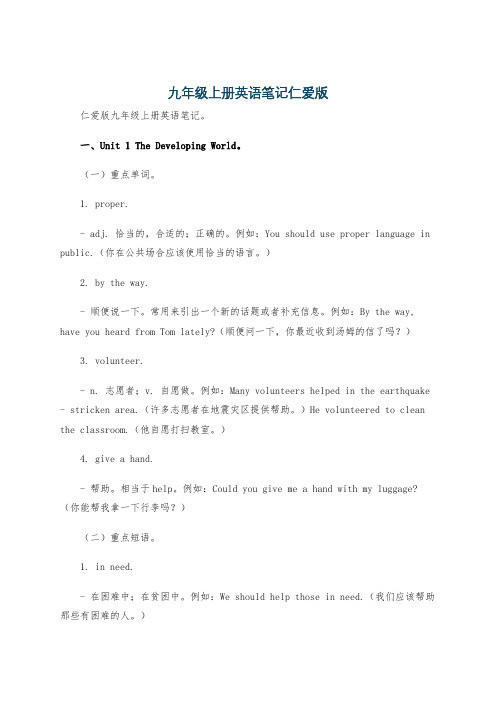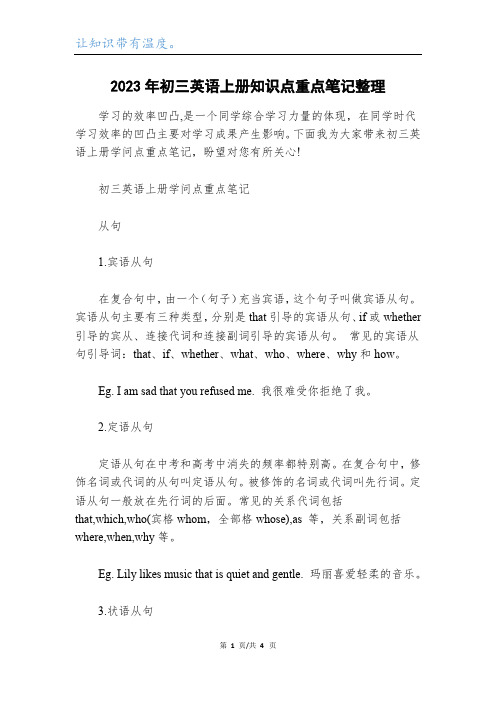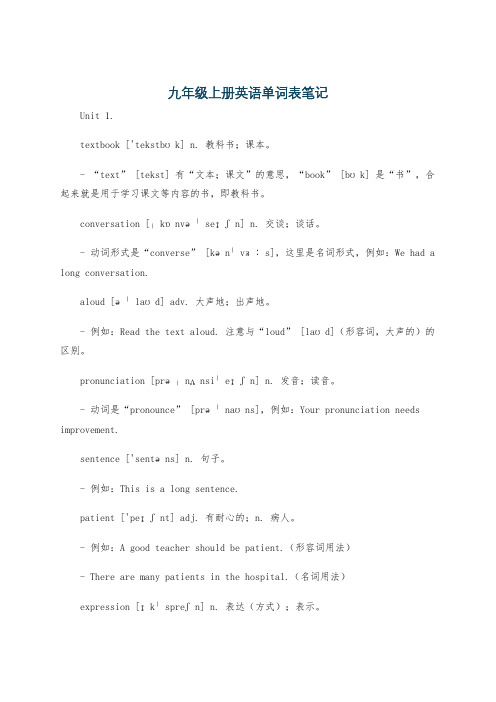英语笔记九年级上册
九年级上册英语课文笔记

九年级上册英语课文笔记Section A.1. 单词部分。
- textbook (n.) 课本;教科书。
例句:We need to bring our textbooks to class.- conversation (n.) 交谈;谈话。
常用搭配:have a conversation with sb.(与某人交谈),例如:I had a great conversation with my teacher yesterday.- aloud (adv.) 大声地;出声地。
区别于loud(adj. 大声的,多用来修饰名词,如a loud voice)和loudly(adv. 喧闹地,往往带有嘈杂的意味)。
例如:Read the text aloud, please.2. 短语和句型。
- by + doing 通过做某事。
这是一个非常重要的表达方式。
例如:You can improve your English by reading English books.- make mistakes 犯错。
mistake是可数名词,常用搭配还有make a mistake。
例如:Everyone makes mistakes when they learn something new.- It's + adj. + for sb. + to do sth. 对某人来说做某事是……的。
例如:It's important for us to learn English well.3. 语法。
- 一般现在时的用法回顾。
在描述经常发生的动作、客观事实或真理时使用。
例如:He often goes to school by bike.(经常发生的动作);The earth goes around the sun.(客观真理)Section B.1. 单词。
- patient (adj.) 有耐心的;n. 病人。
九年级上册英语笔记仁爱版

九年级上册英语笔记仁爱版仁爱版九年级上册英语笔记。
一、Unit 1 The Developing World。
(一)重点单词。
1. proper.- adj. 恰当的,合适的;正确的。
例如:You should use proper language in public.(你在公共场合应该使用恰当的语言。
)2. by the way.- 顺便说一下。
常用来引出一个新的话题或者补充信息。
例如:By the way, have you heard from Tom lately?(顺便问一下,你最近收到汤姆的信了吗?)3. volunteer.- n. 志愿者;v. 自愿做。
例如:Many volunteers helped in the earthquake - stricken area.(许多志愿者在地震灾区提供帮助。
)He volunteered to clean the classroom.(他自愿打扫教室。
)4. give a hand.- 帮助。
相当于help。
例如:Could you give me a hand with my luggage?(你能帮我拿一下行李吗?)(二)重点短语。
1. in need.- 在困难中;在贫困中。
例如:We should help those in need.(我们应该帮助那些有困难的人。
)2. come for a visit.- 来参观;来访问。
例如:My friends will come for a visit next week.(我的朋友们下周将来参观。
)(三)重点句型。
1. Have you come back from your hometown?- 这是一个现在完成时的一般疑问句。
其结构为“Have/Has+主语+过去分词+其他”。
回答可以是Yes, I have.或者No, I haven't.2. There goes the bell.- 这是一个倒装句。
九年级上册英语仁爱版知识点笔记

九年级上册英语仁爱版知识点笔记一、Unit 1 The Developing World。
1. 重点单词。
- develop:v. 发展;开发;冲洗(胶卷)。
例如:China has developed rapidly in recent years.(近年来中国发展迅速。
)- development:n. 发展;开发。
如:With the development of science and technology, our life has changed a great deal.(随着科学技术的发展,我们的生活发生了很大的变化。
)- feed:(fed,fed)v. 喂养;饲养。
例如:My mother feeds the dog every day.(我妈妈每天喂狗。
)- fair:- adj. 公平的;合理的。
如:It's fair to give everyone a chance.(给每个人一个机会是公平的。
)- n. 集市;展销会。
例如:There is a book fair in our city this weekend.(这个周末我们城市有一个书展。
)2. 重点短语。
- give a hand:帮忙。
例如:Could you give me a hand with my English?(你能帮我学英语吗?)- in need:在困难中;在贫困之中。
如:We should help those in need.(我们应该帮助那些有困难的人。
)- come to an end:结束。
例如:The meeting came to an end at 5 o'clock.(会议在5点结束。
)3. 重点句型。
- have/has been to与have/has gone to的区别。
- have/has been to表示“去过某地(人已经回来)”。
例如:I have been to Beijing twice.(我去过北京两次。
2023年初三英语上册知识点重点笔记整理

2023年初三英语上册知识点重点笔记整理学习的效率凹凸,是一个同学综合学习力量的体现,在同学时代学习效率的凹凸主要对学习成果产生影响。
下面我为大家带来初三英语上册学问点重点笔记,盼望对您有所关心!初三英语上册学问点重点笔记从句1.宾语从句在复合句中,由一个(句子)充当宾语,这个句子叫做宾语从句。
宾语从句主要有三种类型,分别是that引导的宾语从句、if或whether 引导的宾从、连接代词和连接副词引导的宾语从句。
常见的宾语从句引导词:that、if、whether、what、who、where、why和how。
Eg. I am sad that you refused me. 我很难受你拒绝了我。
2.定语从句定语从句在中考和高考中消失的频率都特别高。
在复合句中,修饰名词或代词的从句叫定语从句。
被修饰的名词或代词叫先行词。
定语从句一般放在先行词的后面。
常见的关系代词包括that,which,who(宾格whom,全部格whose),as 等,关系副词包括where,when,why等。
Eg. Lily likes music that is quiet and gentle. 玛丽喜爱轻柔的音乐。
3.状语从句状语从句就是由一个句子在复合句中充当状语。
所以状语从句又可以分为时间状语从句、地点状语从句、缘由状语从句、目的状语从句、结果状语从句等等。
每种状语从句都有特定的引导词:(1)地点状语从句:where,wherever(2)时间状语从句:when, while, as, before, until, till, since(3)缘由状语从句:because, since,as, now that, not that…, but that…, seeing that,considering that, in that(4)目的状语从句:so, so that, in order that, that, to the end that, in case,for fear that,lest(5)结果状语从句:so...that, such that, so that, with the result that(6)条件状语从句:if,unless,if only,only if,in case,suppose/supposing(that),provided/providing(that),on condition that,so/as long as(7)方式状语从句:as, as if, as though(8)让步状语从句:though, although, as, even if, even though, whether, no matterwhether...or, no matter with初三英语上册期中学问点现在完成时:1.概念:过去发生或已经完成的动作对现在造成的影响或结果,或从过去已经开头,持续到现在的动作或状态。
九年级上册英语单词表笔记

九年级上册英语单词表笔记Unit 1.textbook ['tekstbʊk] n. 教科书;课本。
- “text” [tekst] 有“文本;课文”的意思,“book” [bʊk] 是“书”,合起来就是用于学习课文等内容的书,即教科书。
conversation [ˌkɒnvəˈseɪʃn] n. 交谈;谈话。
- 动词形式是“converse” [kənˈvɜːs],这里是名词形式,例如:We had a long conversation.aloud [əˈlaʊd] adv. 大声地;出声地。
- 例如:Read the text aloud. 注意与“loud” [laʊd](形容词,大声的)的区别。
pronunciation [prəˌnʌnsiˈeɪʃn] n. 发音;读音。
- 动词是“pronounce” [prəˈnaʊns],例如:Your pronunciation needs improvement.sentence ['sentəns] n. 句子。
- 例如:This is a long sentence.patient ['peɪʃnt] adj. 有耐心的;n. 病人。
- 例如:A good teacher should be patient.(形容词用法)- There are many patients in the hospital.(名词用法)expression [ɪkˈspreʃn] n. 表达(方式);表示。
- 动词是“express” [ɪkˈspres],例如:His expression shows his happiness.discover [dɪˈskʌvə(r)] v. 发现;发觉。
- 例如:Columbus discovered America.secret ['siːkrət] n. 秘密;秘诀;adj. 秘密的;保密的。
九年级英语上册笔记知识点

九年级英语上册笔记知识点一、Unit 1 How can we become good learners?1. 重点单词。
- aloud:出声地;大声地。
例如:read aloud大声朗读。
- pronunciation:发音;读音。
注意其动词形式是pronounce。
- patient:有耐心的;n.病人。
be patient with sb.对某人有耐心。
- discover:发现;发觉。
强调发现原本存在但不为人知的事物。
- secret:n.秘密;秘诀;adj.秘密的。
the secret to………的秘诀。
2. 重点短语。
- by working with friends通过和朋友一起学习。
by+doing表示“通过某种方式”。
- make word cards制作单词卡片。
- listen to tapes听磁带。
- ask the teacher for help向老师求助。
- read aloud to practice pronunciation大声朗读来练习发音。
3. 重点句型。
- How do you study for a test?你是如何为考试而学习的?- I study by making flashcards.我通过制作抽认卡来学习。
- The more you read, the faster you'll be.你读得越多,你(阅读速度)就会越快。
(“the+比较级,the+比较级”结构,表示“越……,就越……”)4. 语法知识点。
- by的用法:- 表示方式、方法,意为“通过……;靠……;用……”,后接名词、代词或动名词。
例如:He makes a living by selling newspapers.他通过卖报纸为生。
- 表示时间,意为“到……为止;不迟于”,常与完成时连用。
例如:By the end of last month, we had learned 2000 English words.到上个月末为止,我们已经学了2000个英语单词。
九年级上册英语书笔记

九年级上册英语书笔记一、Unit 1 How can we become good learners?(一)重点单词。
1. textbook:n. 教科书;课本。
- 例如:Our textbooks are very useful for our study.(我们的课本对我们的学习非常有用。
)2. conversation:n. 交谈;谈话。
- 常构成短语“have a conversation with sb.”(与某人交谈),例如:I had a great conversation with my teacher yesterday.(我昨天和我的老师进行了一次很棒的交谈。
)3. aloud:adv. 大声地;出声地。
- 区别于“loud”(adj. 大声的)和“loudly”(adv. 喧闹地)。
“aloud”侧重于发出声音,让别人能听到,常与“read”搭配,如:Read aloud so that everyone can hear you.(大声朗读以便每个人都能听到你。
)4. pronunciation:n. 发音;读音。
- 例如:His pronunciation is very good.(他的发音非常好。
)5. sentence:n. 句子。
- 可以说“make a sentence”(造句),例如:Let's make sentences with these new words.(让我们用这些新单词造句吧。
)(二)重点短语。
1. by working with friends:通过和朋友一起学习。
- 在回答“How do you study for a test?”(你如何为考试而学习?)时可以说:I study by working with friends.(我通过和朋友一起学习。
)2. make word cards:制作单词卡片。
- 这是一种学习单词的有效方法,例如:I make word cards to help me remember new words.(我制作单词卡片来帮助我记住新单词。
九年级上册英语单词笔记

九年级上册英语单词笔记Unit 1 How can we become good learners?1. textbook /ˈtekstbʊk/ n. 教科书;课本。
2. conversation /ˌkɒnvəˈseɪʃn/ n. 交谈;谈话。
3. aloud /əˈlaʊd/ adv. 大声地;出声地。
4. pronunciation /prəˌnʌnsiˈeɪʃn/ n. 发音;读音。
5. sentence /ˈsentəns/ n. 句子。
6. patient /ˈpeɪʃnt/ adj. 有耐心的;n. 病人。
- be patient with sb. 对某人有耐心。
7. expression /ɪkˈspreʃn/ n. 表达(方式);表示。
8. discover /dɪˈskʌvə(r)/ v. 发现;发觉。
9. secret /ˈsiːkrət/ n. 秘密;秘诀;adj. 秘密的;保密的。
10. look up (在词典、参考书中或通过电脑)查阅;抬头看。
11. grammar /ˈɡræmə(r)/ n. 语法。
Unit 2 I think that mooncakes are delicious!1. lantern /ˈlæntən/ n. 灯笼。
2. stranger /ˈstreɪndʒə(r)/ n. 陌生人。
3. relative /ˈrelətɪv/ n. 亲属;亲戚。
4. put on 增加(体重);发胖。
5. pound /paʊnd/ n. 磅(重量单位);英镑(英国货币单位)6. folk /fəʊk/ adj. 民间的;民俗的。
- folk music 民间音乐。
7. goddess /ˈɡɒdes/ n. 女神。
8. steal /stiːl/ v. (stole /stəʊl/, stolen /ˈstəʊlən/) 偷;窃取。
- 1、下载文档前请自行甄别文档内容的完整性,平台不提供额外的编辑、内容补充、找答案等附加服务。
- 2、"仅部分预览"的文档,不可在线预览部分如存在完整性等问题,可反馈申请退款(可完整预览的文档不适用该条件!)。
- 3、如文档侵犯您的权益,请联系客服反馈,我们会尽快为您处理(人工客服工作时间:9:00-18:30)。
September 1 Unit 1
Words: ①add -- 补充;增加②by -- 通过(prep.) Grammar: 介词后面只能跟有名词、代词和动名词(by+doing)。
Word group: ①making flashcards -- 制作抽认卡
②vocabulary lists -- 词汇表
③ask sb. for help -- 向某人寻求帮助
③study for a test -- 为考试做准备/复习Analysis: ①动名词不能单独作谓语;
②动词能单独作谓语。
动名词的构成:
①一般情况下,直接在后面加-ing;
②以不发音的-e结尾,去掉e,再加-ing;
③重读闭音节,结尾只有一个辅音字母,双写这个辅音字母,
再加-ing。
(e.g. -- get - getting, shop - shopping, swim - swimming, sit - sitting, put - putting)
by的多义:
①通过……的方式(e.g. -- by bus);
②由;被(用于被动语态)(e.g. -- The window was broken
by me);
③在……的旁边(e.g. -- by the river)。
For example: The river is four meters wide.
= It is a four-meter-wide boy.
Add: This job is too difficult for me to do.
Word group: ①sb. spend/spent (in) doing/on sth.
②it takes/took to do sth. (it作为形式主语)
③sb. pay/paid for sth.
④sth. cost/cost some money
Add: What day is it today? -- 询问星期
复合句的注意事项:
①引导词,如how, what, when;
②语序,从句用陈述句的语序;
③时态,一般地,主句和从句时态一致。
反义疑问句的注意事项:
①句式相反,肯定与否定相反;
②助动词、情态动词、be动词前后一致;
③时态一致;
④主语一致。
For example: She was really happy I asked. (原因从句)Word group: get(感官动词)+ adj.
Analysis: ①talk about sth.
②talk with/to sb.
Add: the best ways to learn English(动词不定式作后置定语)Grammar: who作主语,则看作为第三人称单数。
Word group: it's too + adj. + for sb. to do sth.
-- 对于某人来说做某事太……
(e.g. -- It's too difficult for Lily to work out the problem. ) Analysis: ①so…that…
(e.g. -- It's so difficult that he can't clean the room. )
②not enough…to…
(e.g. -- It's not easy enough for him to clean room. ) Word group: keep a diary in English -- 用英语写日记
提建议的方法:
①what/how about + v-ing
②why not/don't you + v.
③you'd better + v.
④let's + v.
⑤you need to + v.
Analysis: ①a lot作副词,修饰动词;
②a lot of作形容词,修饰名词。
Add: ①practice doing ②finish doing
②enjoy doing
Word group: speaking skills -- 口语技巧
Words: ①aloud用在read, speak, call之后;
②-- frustrating -- 使人失望的(主语是物)
-- frustrated -- 令人失望的(主语是人)
Analysis: ①quickly强调时间短暂;
②fast强调速度快。
Add: the words of pop songs(介词短语作后置定语)Grammar: ①feel, smell, taste等感官动词后面跟形容词;
②because引导原因状语从句。
Analysis: ①suggestion为不可数名词;
②advice为不可数名词,如a piece of advice。
Word group: ①watch/see sb. do sth.(动作已经完成)
②hear sb. doing sth.(动作正在进行)Grammar: find + 宾语+ 宾语补足语
(e.g. -- find watching movies frustrating)
Word group: have fun = have a good time = enjoy oneself Words: helpful(动词为help)-- 有帮助的(adj.)
Add: end up -- 以……结束
Word group: ①be afraid to + v.
(e.g. -- I'm afraid to ride the bike.)
②be afraid of + n./pron./v-ing
(e.g. -- I'm afraid of the snakes.) Word: hard(坚硬的)-- soft(柔软的)
Word group: do a survey -- 做调查
Grammar: 当提出的问题希望得到肯定回答,一般疑问句可用some。
Add: I don't know what to do.
= I don't know what I should do.
Word group: ①get the pronunciation right -- 正确发音
②have trouble doing sth. -- 做某事有困难
③on the way to -- 去……的路上
(e.g. -- on the way home)
Add: repeat the sentences that(引导词)are difficult for you
Analysis: ①join指加入组织;
②take part in指参加活动。
Word group: ①first of all -- 首先
②to begin with -- 以……开始
③later on -- 随后
④make sentences -- 造句
Words: maybe为副词(adv.),放在句首,意为“也许;大概”。
Grammar: may, might表示“推测”,而can't表示“不可能”。
Word group: ①make up conversations -- 编对话
②a second language -- 第二语言
③decide to do sth. -- 决定做某事
Words: ①around the world = all over the world
②start to do/doing = begin to do
Analysis: unless和if都引导条件状语从句,但unless表示否定,
if表示肯定。
Words: speak - spoke - spoken
Word group:①be angry with = be mad with/at
②try one's best to do sth.
= do one's best to do sth.
③learn to do -- 学习去做
④time goes by -- 时间流逝
Words: ①affect -- 影响;对……起作用(v.)
②behave -- 行为;表现(v.)
③last -- 持续
Analysis: stay和keep后面都可以跟形容词,且可以互换。
Grammar: 在某种情况下,过去分词可作为形容词使用。
Word group: ①regard…as…-- 把…当作
(e.g. -- We regard him as a hero.)
②complain about -- 抱怨
③be strict with sb. -- 对某人严厉
④change…into…-- 把……变成
⑤part of -- ……的一部分
⑥compare…to/with -- 和……比较Add: with one's help = with the help of sb. Grammar: 形容词修饰不定代词时,应放在不定代词之后。
(e.g. -- something important)
Words: physical -- 身体的;肉体的(adj.)
Word group: let sb. not do sth. -- 让某人不要做某事。
